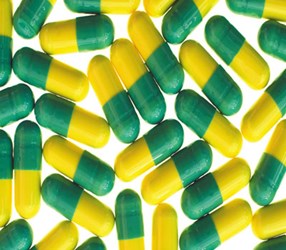FDA News Roundup: Sanofi Pasteur, GSK, Lilly, And More
By Anna Rose Welch, Editorial & Community Director, Advancing RNA

What FDA decisions did you miss this week?
GSK COPD Drug Wins FDA Panel Thumbs Up For Adults
Breo Ellipta has been recommended by an FDA panel to treat asthma in adults age 18 and up. However, the panel does not recommend the treatment be approved for children ages 12 to 17. The drug contains a corticosteroid known as vilanterol, a long-acting beta-agonist (LABA). The panel has recommended the drug be put through a large safety trial to ensure its safety in adults and children compared to other drugs in its class, including GSK’s Advair, AstraZeneca’s Symbicort, and Merck’s Dulera and Foradil. Analysts expect the drug to bring in around $750 million by 2020.
Nicox DMD Drug Named Orphan Drug
Naproxcinod, a CINOD (Cyclooxygenase-Inhibiting Nitric Oxide-Donating) anti-inflammatory candidate, is indicated for the treatment of Duchenne Muscular Dystrophy. Nicox is currently searching for a partner to initiate clinical development of the drug, however the drug has shown promise in preclinical models of muscular dystrophy and was recognized as an orphan drug by the EU in 2013.
Sickle-Cell Disease Drug Designated Orphan Drug
The FDA granted Dilaforette orphan drug designation for its sickle-cell disease drug, sevuparin. The drug is a polysaccharide drug designed to keep blood flowing, preventing microvascular obstructions and vaso-occlusive crisis. The drug is currently poised to enter a Phase 2 study, which is currently enrolling patients.
Lilly, Pfizer Get Nod To Continue Trial
Late-stage clinical trials of NGF inhibitor, Tanezumab, will be reinstated following a pause after concerns the drug was responsible for causing changes to the nervous system and damage to the joints. The drug’s development was halted in 2012, however following Pfizer’s presentation of promising pre-clinical safety data, the company will continue with Phase 3 development. Tanezumab is indicated for chronic osteoarthritis pain, lower back pain, and cancer. The lifting of the FDA ban also guarantees Pfizer $200 million from Lilly according to the companies’ licensing agreement.
FDA Says No To Changed Prescribing, Use Of Lilly Drug
After investigating two deaths of patients taking Lilly’s schizophrenia drug Zyprexa Relprevv, the FDA has announced it will not be recommending changes to the prescribing or use of Lilly’s drug. Elevated levels of the drug were found in two patients who died in 2013 within days of receiving the injection. However, upon closer investigation, the FDA has found the deaths to be inconclusive, saying the increase in drug levels may have occurred post-mortem. The drug already contains a black box warning for post-injection delirium sedation or olanzapine overdose.
CymaBay Therapeutics Wins Orphan Designation
MBX-8025, indicated for homozygous familial hypercholesterolemia (HoFH), was awarded orphan drug designation. The drug is a potent and selective peroxisome proliferator-activated receptor delta (PPARδ) agonist that is currently being moved into a Phase 2 pilot study for HoFH. The company also expects the drug could be used to treat primary bilary cirrhosis, severe refractory hypertriglyceridemia, and NASH. In preclinical models and in patients with dyslipidemia, the drug has proved capable of lowering LDL-C.
Marinus Pharma Epilepsy Drug Named Orphan Drug
Ganaxolone, currently under investigation as an adjunctive treatment in a Phase 2 clinical trial in protocadherin19 gene (PCDH19) female pediatric epilepsy, was awarded orphan drug designation in this indication. The drug is a synthetic analog of the endogenous neurosteroid allopregnanolone, which has shown success treating antianxiety in animals with neuropsychiatric disorders and as an anticonvulsive in epileptic seizures.
Anemia Drug Awarded Orphan Designation
Agios Pharma’s AG-348 was named an orphan drug in the treatment of a rare form of hemolytic anemia known as pyruvate kinase deficiency. The drug met its primary endpoints in two Phase 1 clinical trials (single ascending dose and multiple ascending dose study) enrolling healthy volunteers. This year, the company plans to launch a Phase 2 clinical trial for patients with PK deficiency.
Cangene Anthrax Poisoning Treatment Earns Approval
Anthrasil, Anthrax Immune Globulin Intravenous (Human), was approved to be taken in combination with antibacterial drugs for patients with inhalational anthrax. The drug had been acquired by the U.S. Department of Health and Human Services’ Biomedical Advanced Research and Development Authority (BARDA) to be added as an experimental drug to the U.S. Strategic National Stockpile to be used only under emergency use authorization. Prior to its approval, the drug underwent testing in rabbits and monkeys that were exposed to a lethal aerosolized dose of B. anthracis spores. The product’s safety was tested in 74 human volunteers.
Eylea Approved For Diabetic Retinopathy
Eylea injection was approved for diabetic retinopathy (DR) in patients with diabetic macular edema (DME). The first five doses of the drug are injected into the eye once a month followed by a dose every two months. In two clinical studies enrolling 680 patients comparing Eylea to macular laser photocoagulation, patients taking Eylea saw a significant decrease in the severity of their DR. Now that it’s been granted approval, Eylea will join Lucentis (ranibizumab injection) on the market as a treatment option for those with DR. The drug is already approved for wet age-related macular degeneration and DME.
Sanofi Pasteur Vaccine Wins Nod Of Approval
Quadracel DTaP-IPV vaccine is now approved for use in children age four to six for protection against diphtheria, tetanus, pertussis, and poliomyelitis. The vaccine is to be administered as the fifth dose in the DTaP series, and as the fourth or fifth dose in the inactivated poliovirus vaccine series (IPV). The vaccine’s safety and immunogenicity was examined in a Phase 3 study alongside DAPTACEL and IPOL vaccines
